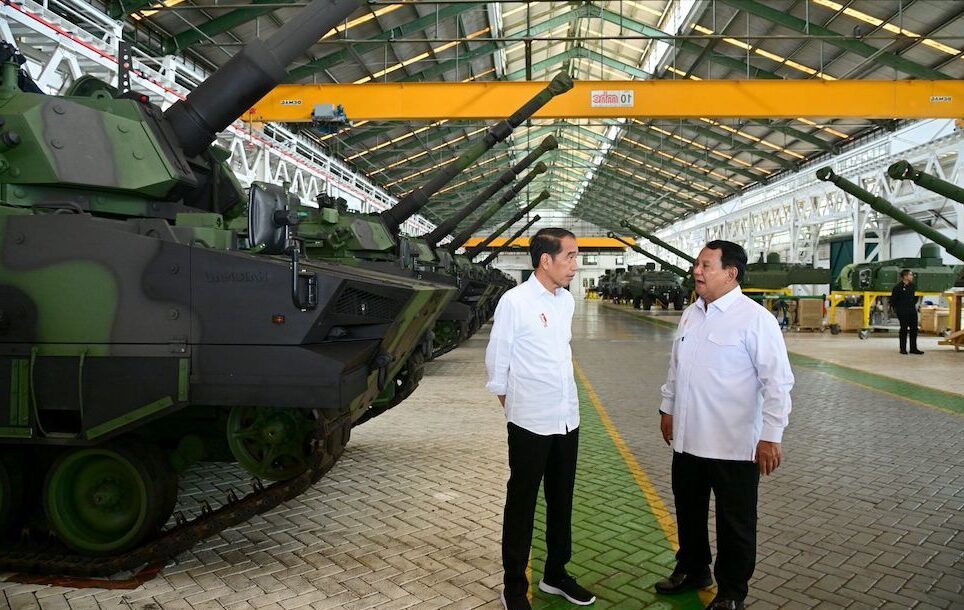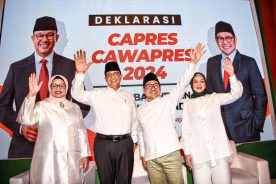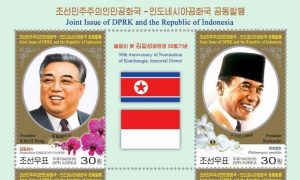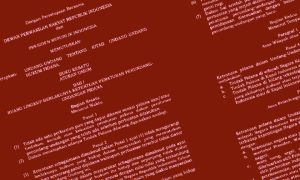On 25 October Prabowo Subianto registered his candidacy for Indonesia’s 2024 presidential election. This declaration itself carried little surprise. The former general’s presidential ambitions were an open secret; having tried twice and failed in 2014 and 2019, it was clear to anyone who knows a little about Indonesian politics that he would try for the third time in 2024.
While Prabowo declaring his presidential aspiration might have been a non-story, what drew more public interest, and scrutiny, was the announcement that Gibran Rakabuming, president Joko Widodo’s (Jokowi) oldest son, would be Prabowo’s vice-presidential candidate.
By giving “permission”—some would say advocating for—his son to run alongside Prabowo, Jokowi has done something that no Indonesian presidents before him had done: he put his child explicitly on a path to the highest elected office in the country. The notoriously corrupt and nepotistic Soeharto gave his children sweet business deals. But the closest his children ever been to a state position was when he appointed one of his daughters, Siti Hardiyanti Rukmana, as a minister in his last cabinet in 1998.
Megawati Soekarnoputri and her late husband Taufik Kiemas had always been said to have high hopes for their daughter, Puan Maharani, to become vice president or even president. But to date they have never put her on a presidential ticket. Susilo Bambang Yudhoyono (SBY), too, had similarly high ambitions for the political future of his eldest son, Agus. But voters seem to disagree with a father’s glowing hope for his son: Agus was eliminated in the first round of the 2017 Jakarta gubernatorial election, and his low electability ratings have never put him within striking distance of a presidential ticket.
Much has been written about this Prabowo–Gibran declaration from the perspective of political dynasticism, or about how this political manoeuvre has upset even Jokowi’s inner circle and placed him in opposition to his own party, PDI-P and its matriarch Megawati. These are all important and interesting perspectives. But I am interested in something different: not only in Jokowi’s goals and strategies, but more importantly in factors that may hinder or facilitate the attainment of these goals.
Jokowi’s end game
I attribute two end goals to Jokowi’s many political manoeuvres, from co-opting the Constitutional Court, until recently under the leadership of a chief justice who was his brother in-law, to having his son positioned as Prabowo’s running mate.
First, Jokowi is interested in ensuring the security of his political and economic legacies. He will want the new capital city of Nusantara to continue, the “omnibus” Law on Job Creation to stay as the law of the land, for infrastructure development to expand, and for the resource nationalism and downstreaming (hilirisasi) paradigm to thrive, among others.
Second, Jokowi is interested in maintaining some level of political clout. This cannot be separated from the first goal. In a party system where parties do not have distinct and consistent platforms, a leader’s policies often can be advanced and preserved only through personalistic appeals.
But it also goes beyond the first set of policy goals sketched above. The integrity and capacity of the judiciary and the broader criminal justice system have always been a work-in-progress in Indonesia. Maintaining political clout after leaving office means reducing the likelihood of the justice system being turned against one’s self and one’s family—whether unjustifiably as part of a political vendetta, justifiably because a crime one did while in office, or a combination of both.
These two goals intentionally underplay the dynastic component of Jokowi’s manoeuvres. Political dynasticism is unhealthy for democratic life, but it is likely just a means to an end. To some, a political dynasty is a means to ensure their descendants have access to wealth and power. To others, it is a means to ensure that their visions of the society will be implemented. Still, to some others, it is a means to get around the challenge of a low-trust environment: turning to family networks becomes a reasonable strategy when you cannot trust your political allies to act in your interests.
Why Prabowo could be a miscalculation
In attaching his son to Prabowo’s ticket, Jokowi obviously sees it as the most feasible way to achieve his political goals. He likely believes that Prabowo, if winning the election, will secure his policy legacy. He also believes that having his son in the second highest office in the country will maintain, if not expand, the family’s political clout and shield it from political and legal witch-hunts.
Beliefs can turn into reality. But beliefs can also be a miscalculation. There are three reasons why placing his political future in Prabowo might be a serious miscalculation for Jokowi.
The first reason is that even if Prabowo wins the election Jokowi will not have an electoral vehicle, in the form of a party, that he can control to influence policymaking in the parliament (DPR). By supporting Prabowo, Jokowi practically abandoned the party that made him a household name, PDI-P. It is perhaps true that Jokowi was never in control of PDI-P anyway because of Megawati’s role as the party’s matron. But, for better or worse, PDI Perjuangan stood by Jokowi’s side in all of his signature policies―the new capital, the omnibus law, the revisions to the anti-corruption law, the new criminal code, to name a few.
As the political scientist E. E. Schattschneider noted, “[m]odern democracy is unthinkable save in terms of parties.” Jokowi will not be able to influence what is happening and discussed in parliament unless he has a party that he controls. No matter how popular Jokowi is among voters, those DPR members will listen to and obey only their party leaders.
The realities of intra-NU politics defy Muhaimin Iskandar’s claim of bringing NU communities in behind Anies Baswedan.
NU factionalism on show after Anies-Muhaimin surprise
To make matters more challenging, Jokowi himself has all but assured the military’s growing influence in Indonesian politics by expanding the opportunities for military officers to hold civilian office. For Jokowi to think that Prabowo the president would be the same man as Prabowo the defence minister would be at best naïve and at worst delusional. One does not simply instruct the men controlling the guns what to do, especially if one no longer has the authority to do so.
Third, with no political vehicle and lacking access to coercive force, Jokowi would have to rely on grassroots movements to stay relevant. Yet, Jokowi is again lacking here. Jokowi is not Abdurrahman Wahid, who commanded tens of thousands of loyal followers in Nahdlatul Ulama. He has voters, but not necessarily the militant supporters one can bring to street demonstrations and put pressure on the government. It remains to be seen whether his supporter networks such as ProJo will stay loyal after he no longer has patronage to distribute.
These are reasons why backing Prabowo could be seen a miscalculation. But it is not my point to argue that it is: backing Prabowo is still a calculated move, albeit a high risk one. One can easily observe at least two scenarios where this calculated risk would yield a high return.
When Prabowo pays off
Just to address the elephant in the room, the first scenario is concerned with the fact that Prabowo is no longer young. If he wins the election he would be sworn into office on 20 October, 2024 at the age of 73, just four years shy of the age of Soeharto when he was forced to step down by student protests. Should Prabowo at some point no longer have the capacity to execute the duties of the presidency, Gibran would have to step up and none of the above challenges regarding the limits on Jokowi’s post-presidential power would matter anymore.
The second scenario is if Jokowi, through some manoeuvres, manages to take control of one of the major parties during a Prabowo presidency. This would give him a political vehicle to influence policymaking and an actual mass base to mould and persuade Prabowo’s administration.
The appointment of Jokowi’s youngest son, Kaesang Pangarep, as chairperson of the Indonesian Solidarity Party (PSI) is a move in that direction. But PSI is too small to be effectual. To influence policymaking, Jokowi needs a bigger party. Golkar is an appealing target. It has no ideological platform and no abiding attachment to individual leaders. It is simply attracted to power and whoever wields it. A senior Golkar figure put it bluntly that “Golkar has no talent for being in opposition, because it was born to be in power and manage the government.”
The fact that Jokowi has planted favours among influential Golkar figures by having them as ministers, and that Jokowi’s long-time ally and confidante Luhut Pandjaitan is the chair of the party’s advisory board, could help with such a takeover. In the Golkar party congress scheduled for 2024, Jokowi could support a leadership ticket amicable to his agenda, or he could simply put forward his family to fill in key positions at Golkar, as rumours about Gibran and his son-in-law (and incumbent mayor of Medan) Bobby Nasution leaving PDI-P and joining Golkar seem to suggest.
Another appealing takeover target is perhaps rather surprising: PDI-P. Sooner or later Megawati, 76 years old, has to pass the leadership baton to someone. Puan Maharani is an obvious choice due to her Soekarno ancestry. But many inside the party might want to modernise it and lead it in a different direction. Soekarno and ties with Soekarno would still be important, but as a symbol and ideological compass more than an automatic admission ticket to the leadership position.
Should such an opening happen, Jokowi would be in a position to take advantage of it. It would be a marriage of convenience: Jokowi would have a political vehicle to continue his influence even after leaving office, and PDI-P would have a popular vote getter who is their cadre, though perhaps in the eyes of many in the party, a once-disgraced one.
Conclusion
Jokowi has placed his eggs in the Prabowo basket. But it is unlikely that he will just pray that the basket is good. Jokowi knows that if he could turn his back on the party that had been his home for 20 years, there is no reason why Prabowo could not do the same to him once in power.
He will have to take further steps to protect his investment in Prabowo, whether by institutionalising his volunteer networks or, more likely, by ensuring control of and continuing support from one of the major parties. Only through these steps can Jokowi ensure that his support for Prabowo will not end up as a miscalculation.
 Facebook
Facebook  Twitter
Twitter  Soundcloud
Soundcloud  Youtube
Youtube  Rss
Rss 



